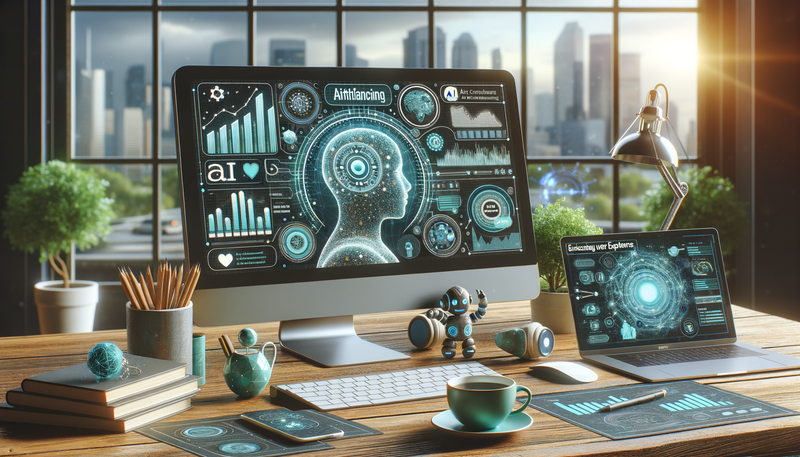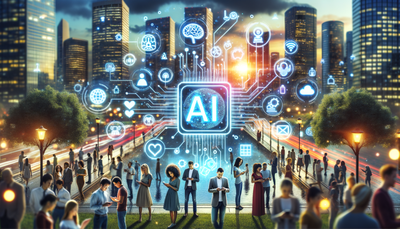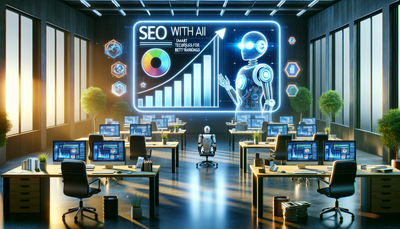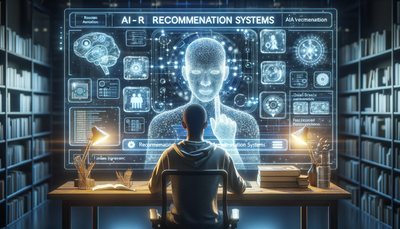10 Ways AI Can Revolutionize Your Website's User Experience
Artificial Intelligence (AI) is revolutionizing the way websites interact with users, offering unprecedented opportunities to enhance user experience. This article explores ten innovative ways AI can transform your website, from intelligent chatbots to personalized content recommendations. By implementing these AI-powered solutions, you can significantly improve user engagement, satisfaction, and overall website performance. Discover how AI can analyze user behavior, predict preferences, and deliver tailored experiences that keep visitors coming back for more. Whether you're running an e-commerce platform, a content-driven site, or a service-based business, these AI applications can help you stay ahead of the competition and meet the evolving expectations of your audience.Table of Contents:
-
1. AI-Powered Chatbots for Instant Customer Support
- 2. Personalized Content Recommendations
- 3. Smart Search Functionality
- 4. Dynamic Pricing and Offer Optimization
- 5. Predictive User Behavior Analysis
- 6. Voice Search and Navigation
- 7. Automated Content Generation and Curation
- 8. Sentiment Analysis for User Feedback
- 9. Visual Recognition and Processing
- 10. Adaptive User Interfaces
- 2. Personalized Content Recommendations
- 3. Smart Search Functionality
- 4. Dynamic Pricing and Offer Optimization
- 5. Predictive User Behavior Analysis
- 6. Voice Search and Navigation
- 7. Automated Content Generation and Curation
- 8. Sentiment Analysis for User Feedback
- 9. Visual Recognition and Processing
- 10. Adaptive User Interfaces

1. AI-Powered Chatbots for Instant Customer Support
Implementing AI-powered chatbots on your website can revolutionize customer support and engagement. These intelligent virtual assistants can handle multiple inquiries simultaneously, providing instant responses to common questions and guiding users through various processes. Advanced chatbots can understand context, learn from interactions, and even detect user sentiment, allowing them to offer more personalized and empathetic responses.By integrating chatbots, you can significantly reduce response times, improve customer satisfaction, and free up your human support team to focus on more complex issues. Additionally, chatbots can collect valuable data on user preferences and pain points, helping you continually refine your website and products to better meet customer needs.
Do you need a website? Want to build a website but don't know where to start? Our website builder is the perfect solution. Easy to use, and with the ability to customize to fit your business needs, you can have a professional website in no time.
2. Personalized Content Recommendations
AI algorithms can analyze user behavior, preferences, and historical data to deliver highly personalized content recommendations. By implementing this technology, your website can suggest relevant articles, products, or services tailored to each individual user's interests and needs.This level of personalization not only enhances the user experience but also increases engagement, time spent on site, and conversion rates. For e-commerce sites, AI-powered recommendation engines can boost cross-selling and upselling opportunities by suggesting complementary or higher-value products based on the user's browsing and purchase history. Content-driven websites can use similar techniques to keep readers engaged by recommending related articles or multimedia content that aligns with their interests.
3. Smart Search Functionality
AI-enhanced search capabilities can dramatically improve user experience by providing more accurate and relevant results. Natural Language Processing (NLP) algorithms enable search functions to understand user intent, context, and even colloquial language, delivering more precise results than traditional keyword-based searches.Advanced AI search features can also incorporate visual search capabilities, allowing users to find products or information based on images rather than text. This is particularly useful for e-commerce sites or visual-heavy content platforms. Additionally, AI can power auto-suggest and autocorrect features, making it easier for users to find what they're looking for, even if they're unsure of the exact terminology or make typos.
Building a website with SITE123 is easy
4. Dynamic Pricing and Offer Optimization
For e-commerce websites, AI can revolutionize pricing strategies and offer management. By analyzing vast amounts of data, including market trends, competitor pricing, inventory levels, and individual user behavior, AI algorithms can dynamically adjust prices and create personalized offers in real-time.This intelligent pricing optimization can help maximize revenue while ensuring competitiveness in the market. Moreover, AI can identify the most effective times and channels to present special offers or discounts to specific user segments, increasing the likelihood of conversion. By tailoring pricing and offers to individual users based on their browsing history and preferences, you can create a more engaging and personalized shopping experience.
5. Predictive User Behavior Analysis
AI-powered predictive analytics can anticipate user needs and behaviors, allowing your website to proactively meet those needs. By analyzing patterns in user interactions, AI can predict which pages a user is likely to visit next, what products they might be interested in, or when they're most likely to make a purchase.This predictive capability enables you to optimize your website's navigation, content placement, and call-to-action buttons to guide users more effectively through their journey. For instance, you can dynamically rearrange page elements or highlight specific features based on predicted user intent. This level of anticipation not only improves user experience but can also significantly boost conversion rates and customer satisfaction.
6. Voice Search and Navigation
As voice-activated devices become increasingly popular, integrating voice search and navigation capabilities into your website can significantly enhance user experience. AI-powered voice recognition technology can understand and process natural language queries, allowing users to interact with your website hands-free.This feature is particularly beneficial for users with accessibility needs or those who prefer voice commands. By implementing voice search, you can make your website more inclusive and user-friendly. Additionally, voice navigation can simplify complex processes, such as filling out forms or navigating multi-level menus, making it easier for users to accomplish their goals on your site.
7. Automated Content Generation and Curation
AI can revolutionize content creation and curation processes, helping you maintain a fresh and engaging website. Natural Language Generation (NLG) algorithms can produce human-like text for product descriptions, news updates, or reports based on structured data. This capability is particularly useful for e-commerce sites with large inventories or news portals that need to generate content quickly.Moreover, AI can assist in content curation by analyzing user preferences and trending topics to automatically compile relevant articles, images, or videos. This ensures that your website always presents up-to-date and interesting content to your visitors, improving engagement and encouraging repeat visits. AI can also help optimize content for search engines by suggesting relevant keywords and meta descriptions.
8. Sentiment Analysis for User Feedback
Implementing AI-powered sentiment analysis tools can provide valuable insights into user opinions and emotions regarding your website, products, or services. These tools can analyze user comments, reviews, and social media mentions to gauge overall sentiment and identify specific areas of satisfaction or concern.By understanding user sentiment, you can quickly address issues, improve products or services, and enhance the overall user experience. Sentiment analysis can also help you identify brand advocates and potential influencers among your users, allowing you to leverage positive sentiment for marketing purposes. Additionally, this technology can be used to monitor real-time sentiment during live events or product launches, enabling you to respond promptly to user reactions.
9. Visual Recognition and Processing
AI-powered visual recognition technology can enhance user experience by enabling advanced image-based features on your website. For e-commerce sites, this can include visual search capabilities, allowing users to find products by uploading images or using their device's camera. AI can also automatically tag and categorize images, improving search functionality and content organization.Moreover, visual recognition can be used to create virtual try-on experiences for fashion or cosmetics websites, allowing users to see how products would look on them before making a purchase. For content-driven sites, AI can analyze images to provide better alt text for accessibility and improve SEO. These visual AI capabilities not only enhance user experience but also make your website more interactive and engaging.
10. Adaptive User Interfaces
AI can power adaptive user interfaces that automatically adjust to individual user preferences and behaviors. By analyzing how users interact with your website, AI algorithms can dynamically modify layout, content placement, and navigation elements to create a more intuitive and personalized experience for each visitor.This adaptability can extend to adjusting font sizes, color schemes, or button placements based on user interactions and accessibility needs. AI can also optimize the user interface for different devices and screen sizes, ensuring a consistent and user-friendly experience across all platforms. By continuously learning from user interactions, adaptive interfaces can evolve over time, constantly improving the user experience and potentially increasing conversion rates and user satisfaction.





